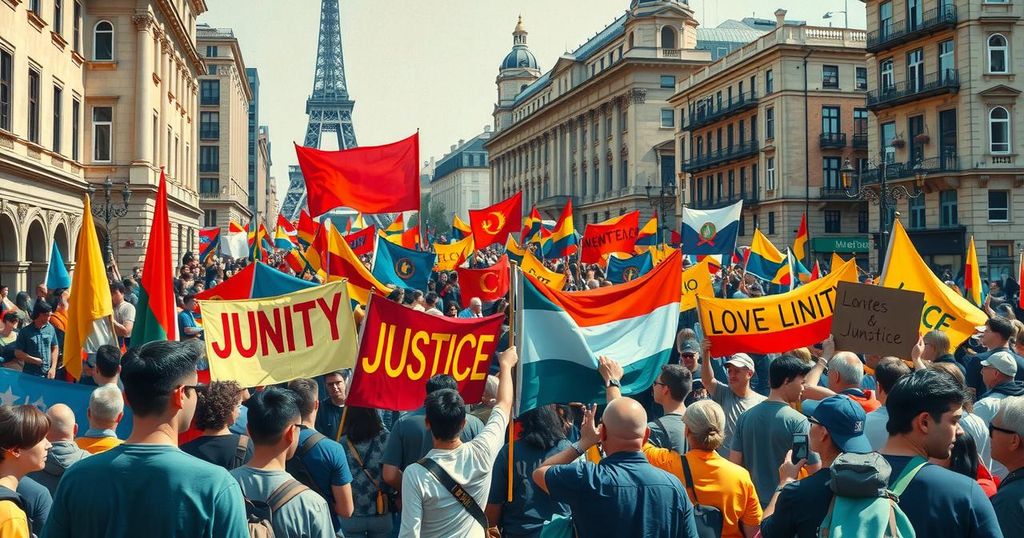Argentina Commemorates 49 Years Since Military Coup with Massive March

On the 49th anniversary of Argentina’s military coup, tens of thousands participated in a national march to honor victims of state terrorism. Under the theme “Memory, Truth, and Justice,” demonstrators opposed President Javier Milei’s administration and advocated for the identification of those disappeared by the dictatorship. Esteemed human rights leaders emphasized the importance of historical memory, amidst ongoing political challenges.
On Monday, tens of thousands of Argentinians took to the streets to mark the 49th anniversary of the coup d’état that initiated a brutal military regime from 1976 to 1983. Demonstrators, under the slogan “Memory, Truth, and Justice,” held torches and portraits of their missing relatives, emphasizing the ongoing struggle to remember the victims of state terrorism.
The remembrance march coincided with the National Day of Memory for Truth and Justice, a public holiday that saw diverse groups—including human rights organizations, political parties, labor unions, and student movements—unite in Buenos Aires. The march concluded at the iconic Plaza de Mayo, directly in front of the government house.
For the first time in nearly two decades, major human rights organizations united in their opposition to President Javier Milei, following a rift in 2006 regarding their collective approach. Esteemed advocates such as Estela de Carlotto, Taty Almeida, and Adolfo Pérez Esquivel read a significant document during the latter part of the rally, highlighting the consensus achieved.
The march was prominently led by representatives of the Madres de Plaza de Mayo and Abuelas de Plaza de Mayo, who have relentlessly sought justice for the disappeared individuals during the dictatorship years. Political discourse marked the rally, focusing on the controversies surrounding the Milei administration’s funding cuts to human rights organizations and attempts to alter historical narratives pertaining to the dictatorship.
In an announcement just hours before the march, President Milei revealed plans to declassify military intelligence files from the dictatorship period, which will be made accessible through Argentina’s National Archives. Human rights organizations estimate that approximately 30,000 individuals were forcibly disappeared during the junta’s rule, underscoring the enduring quest for truth and justice.
The Abuelas de Plaza de Mayo, whose efforts target the recovery of children abducted during the regime, confirmed progress in 139 cases out of an estimated 350 to 400 stolen children. “We need all of society to find them all; it’s never too late… the state must guarantee the restitution of our granddaughters and grandsons,” emphasized Carlotto in her address during the march.
The Argentine dictatorship is recognized as one of the most severe in a series of repressive regimes throughout Latin America during the latter part of the 20th century. Amidst this historical backdrop, President Milei’s controversial questioning of the disappeared count has prompted widespread outrage among citizens.
The demonstration witnessed people brandishing signs that condemned Milei—including shouts of “Milei, garbage, you are the dictatorship”—while expressing their dissatisfaction with his economic policies, which have victimized social services and historical memory sites. Despite recent tumultuous protests, the march on Monday unfolded peacefully, reflecting a resilient collective memory.
Participants such as María Eva Gómez expressed the vital importance of commemorating these events, stating, “We live in a democracy that costs us a great deal of innocent blood. The only way to preserve it is by keeping that in mind.” Another attendee, Elías Pérez, noted, “There are still missing people that we haven’t found … that’s why the demonstration was so massive.”
The massive march in Argentina commemorated the victims of state terrorism as citizens united under the banner of “Memory, Truth, and Justice.” The event, marking the anniversary of the military coup, highlighted the ongoing challenges faced by human rights advocates under the current government. Despite political tensions and recent austerity measures, the collective resolve among demonstrators remains strong, emphasizing the importance of remembering the past to ensure a just future.
Original Source: www.batimes.com.ar







